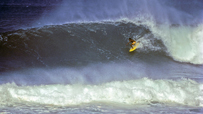Your knowledge of the Hawaiian big-wave surfer Eddie Aikau may extend no deeper than the contest held in his name, "The Eddie," or the ubiquitous bumper sticker slogan, "Eddie Would Go."
In fact, the 2011-12 invitees to the Quiksilver Big Wave Invitational in Memory of Eddie Aikau are at Waimea Bay on Thursday celebrating the man's life and legacy at this year's opening ceremony. And although his image has been marketed to great success, there's never been so much as a profile of Eddie Aikau in Surfer or Surfing magazine.
Having been lost at sea in 1978, the romance of his story gained heft even as his cultural contributions traveled without attribution. But according to former Surfer magazine editor and filmmaker Sam George, every surfer has been touched by those contributions.
Among them, Aikau accepted a post as the North Shore's first lifeguard -- despite his early competitive success -- thus establishing one of the most capable lifeguard services in the world. Aikau also participated in and fueled a grassroots renaissance of Hawaiian culture that continues today. The spirit of camaraderie that thrives amongst the current big-wave community today is also, in many respects, a legacy of Aikau.
Jeff Divine on Eddie Aikau
 WIDTH="203" HEIGHT="114" BORDER="0" ALT="">
WIDTH="203" HEIGHT="114" BORDER="0" ALT="">
Iconography of a Hawaiian legend. Gallery![]()
Through interviews with friends, family members, athletic rivals and academics, the docu-team of Stacy Peralta, Paul Taublieb and Sam George have been hard at work investigating a life that often embodied the best of what Hawaiian surfing has given the world. ESPN recently spoke with Sam George about the project.
ESPN.com: What surprises has your research uncovered about this iconic figure?
Sam George: There's a cultural component to the Eddie Aikau story that makes it broader than a simple biography. As his brother Clyde explained, growing up in the '50s and '60s, Hawaiian identity was not something you were proud of. Their indigenous culture had been systematically suppressed. Eddie rediscovering his "Hawaiianess" in the surf was a true expression of his Polynesian roots.
Surfing does not get the credit it deserves as a cultural force. Look at all of the most potent symbols of "Hawaii" to the outside world. The pineapple came from the Philippines, the grass skirt came from Yap in Micronesia, the ukulele came from Madeira off of Portugal -- only surfing is an authentic expression of Hawaiian culture. There are really strong parallels between the formation of the Outrigger Canoe Club -- an all-white water sport club in Waikiki -- and the Hui Nalu, a club formed by the Hawaiians. Eddie was present at the rebirth of Hawaiian culture and that's why he became such a potent figure.
You say Aikau's character contained an element that directed his life in a way.
I believe it came from being a part of that big family, but Eddie had something in his nature that gave him the role of a protector. He was a great athlete growing up, but he dropped out of school to make money for the family. Lots of guys could have been the first North Shore lifeguard, but Eddie did it. In 1976, he tracked down Rabbit Bartholomew where he was in hiding to mediate the dispute between the Hawaiian and Australian surfers [chronicled in "Bustin' Down the Door"]. Even his brother Clyde admitted that he wouldn't mind kicking some Aussie butt. Eddie had this thing that just made him want to help people, and that's what makes his eventual death [when he left the floating wreck of the Hokule'a to find help for his crewmates] so poignant.
Could you find a clear trajectory in a life that ended over 30 years ago?
In December of '67, Waimea was bigger than anyone remembered it being. That's when Eddie stepped up and really took his place among the big-wave community. He'd always wanted to win the Duke Classic, and although he was a perennial runner-up, he didn't win the Duke until 1977. You would think that would have been the culmination of his story, but Eddie was already looking for something more. Three months later he set sail for Tahiti. That was going to be his next chapter.
You've conducted a lot of interviews with his friends and family. Was there a relationship that drew you in?
An interesting part of the story is the bond between Clyde and Eddie. They shared so many experiences that when Clyde is talking about his own life, he's also talking about Eddie's. They grew up side-by-side in Waikiki. Clyde did better in contests at Ala Moana, but Eddie made a name for himself in big waves. That big day in '67 Clyde cut school to ride the bus out to Waimea and watch Eddie surf alongside Greg Noll, Peter Cole and Ricky Grigg. Afterward, Clyde asked his older brother, "Can you teach me to ride big waves?" Then Eddie, who'd always wanted to win the Duke, watches his younger brother slip into the contest as an alternate and win it. For a while after Eddie died, Clyde didn't know what to do. He was depressed. He stopped surfing. And then when 'The Eddie' was established as a contest, Clyde went and got Eddie's board out of a shed and won the inaugural event on it.
